2019年春八年级英语下册 Unit 8 Save Our World Lesson 48 Garbage Is Interesting课件 (新版)冀教版
- 格式:pptx
- 大小:244.69 KB
- 文档页数:18
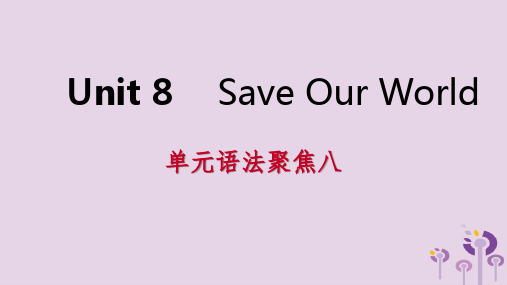
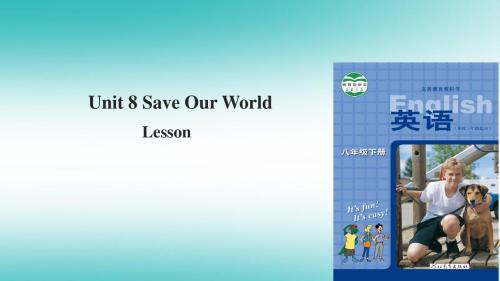

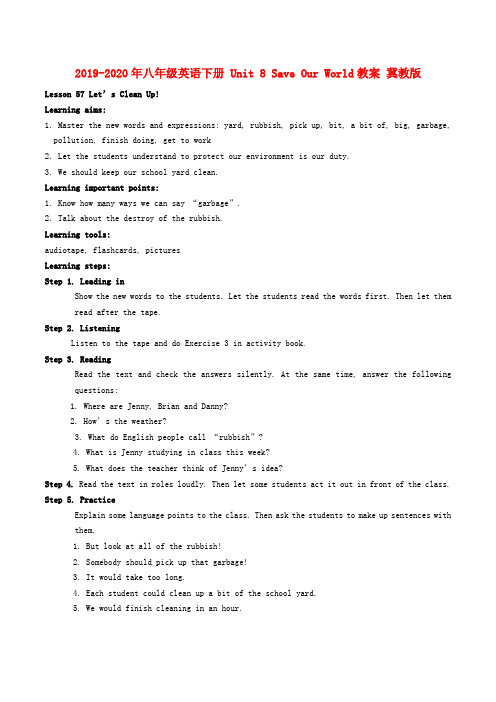
2019-2020年八年级英语下册 Unit 8 Save Our World教案冀教版Lesson 57 Let’s Clean Up!Learning aims:1. Master the new words and expressions: yard, rubbish, pick up, bit, a bit of, big, garbage,pollution, finish doing, get to work2. Let the students understand to protect our environment is our duty.3. We should keep our school yard clean.Learning important points:1. Know how many ways we can say “garbage”.2. Talk about the destroy of the rubbish.Learning tools:audiotape, flashcards, picturesLearning steps:Step 1. Leading inShow the new words to the students. Let the students read the words first. Then let them read after the tape.Step 2. ListeningListen to the tape and do Exercise 3 in activity book.Step 3. ReadingRead the text and check the answers silently. At the same time, answer the following questions:1. Where are Jenny, Brian and Danny?2. How’s the weather?3. What do English people call “rubbish”?4. What is Jenny studying in class this week?5. What does the teacher think of Jenny’s idea?Step 4. Read the text in roles loudly. Then let some students act it out in front of the class. Step 5. PracticeExplain some language points to the class. Then ask the students to make up sentences with them.1. But look at all of the rubbish!2. Somebody should pick up that garbage!3. It would take too long.4. Each student could clean up a bit of the school yard.5. We would finish cleaning in an hour.Lesson 58 Stop PollutionLearning aims:1. Master the new words and expressions: less, environment, throw away,least, take out, waste, fix, toilet2. This lesson focuses on the environment issues.3. It presents some solutions to the problems that pollution poses.Learning important points:1. It presents thought-provoking facts and figures abut pollution in North America.2. Call on the students to take personal action to reduce pollution.Learning tools:audiotape, flashcards, picturesLearning steps:Step 1. e to “THINK ABOUT IT.”Step 2. Show the new words to the class. First let them read them by themselves. Then read them after the teacher. Practice the words for a while.Step 3. Talk about the questions:Show some pictures about our environment to the class. Let the students work in three or four to finish the task.1. What do you think our environment?2. What can we do to reduce pollution?3. Do you know anything about the environment in foreign countries? Can you give an example? Step4. ListeningListen to the tape and finish Exercise 2 in activity book.1. In North America, many students help their school make more pollution.2. In an environment club, people work together to make the environment clean.3. Environment clubs encourage students to bring their lunches in plastic bags.4. They give prizes to the classes that make the least garbage.5. On a no-car day, only teachers e to school by car. No students e to school by car.6. A leaking toilet can waster twenty to forty litres of water an hour.7. In environment clubs, students don’t fix leaky toilets and sinks.8. A hundred kilograms of recycled paper saves seventeen trees.Step 5. ReadingRead the text in silence. Check the answers. Then let the students read the text in class loudly.Step 6. DiscussionAnalyze the text and make a further discussion about it. Let’s discuss its details.1. What do people in an environment club do?2. On no-car day, how do people e to work? How do students e to school?3. What do you know about a leaking toilet?Lesson 59 Let’s look at Garbage!Learning aims:1. Master the new words and expressions: sort, metal, weight, percent2. Call on the students to take actions to protect our environment.3. Learn about the pollution problems in our life.Learning important points:1. Offering help.2. Learn new vocabulary for describing materials and for paring qualities.Learning tools:audiotape, flashcards, picturesLearning steps:Step 1. Remind the students:1. What kinds of rubbish do you throw every day? Can you name them?2. What can be recycled?Step 2. Work in groupsLet the students go to the dustbin to collect some garbage and take them to the classroom.Ask the students name them and pare the qualities.Let the students look up the books and the dictionaries when they are in trouble. Help them when they can’t express correctly.Step 3. ListeningListen to the tape finish Exercise 2 in the activity book.1. Every year, each person in North America makes about 1000 kilograms of garbage.2. Plastic makes the most garbage.3. In just one day, Americans throw out 136 million kilograms of packaging.4. Packaging makes the most garbage.Step 4. ReadingRead the text and check the answers.Let the students read the text in roles. Then ask several students to act out the dialogue. Step 5. e to “PROJECT”Bring the students to pick up the garbage in the school yard. Put the garbage into bags and bring it to school for our project.Take a walk around your neighbourhood, take a bag with you and pick up any garbage you see.Wear gloves, because garbage in dirty.Now sort the garbage into paper, plastic, metal, glass and others.Then pare the garbage in school yard with that in neighbourhood.Have students work in the same groups or in new groups. Each group will make a poster about what things they can do to help reduce pollution in the world.Lesson 60 Fix and MendLearning aims:1. Master the new words and expressions: mend, must, touch, repair, cassette, deck, buzz, exactly,reuse, power2. Learn about the knowledge of environment.3. Tell the students to save and protect the resources is our duty.Learning important points:1. In order to save our environment, we should fix and mend something in our daily life.2. Feel the beauty of music.Learning tools:audiotape, flashcards, picturesLearning steps:Step 1. Leading inAsk the students some questions:1. What do you do when your pants have a hole?2. What do you do with when your shoes have a tear?Work in pairs and discuss the questions. Step2. Listen to the tape. Feel the rhythm of the song.Step 2. ReadingRead the song as a lyric poem. Let the students read after you. Then let them read and translate it. They must add their feelings in it.Step 3. ListeningListen to the tape again. Let’s sing after it.Step 4. Ask some volunteers to e to the front and act it out.Step 5. PracticeWork in groups of three or four. Give examples of the things that we can do around us. Discuss and give a report to the class.Lesson 61 What Was in the Bags?Learning aims:1. Master the new words and expressions: more, most, bad, litter, a little bit2. Build the belief to save our earth.3. Cultivate the feelings of responsibilities.Learning important points:1. Learn new vocabulary for describing materials and for paring quantities.2. Learn mon expressions for offering assistance.Learning tools:audiotape, flashcards, garbageLearning steps:Step 1. Leading-inTake out the garbage and put it on the floor. Let’s discuss what we can reuse and recycle.Ask the students work in their groups and imagine what we can do with it. Give a report to the class.Step 2. ListeningListen to the tape and finish the exercise.Danny and Jenny are very _______ to know that people throw ______ _______ waste things away.Danny finds a _______ ______. One of the ________ is broken. He will take it _______ and _______ it. After he _______ it, he will give it to _________ _______, Debbie. ________ should throw away a toy like tat. It’s not _______ to waster things.A lot of the ______ is broken. That’s bad! Once Danny _______ his foot on a piece of brokenglass.Step 3. ReadingRead the text and check the answers. Let the students it loudly in class. Then read it in roles.Step 4. DialogueUse the garbage we have brought to the class. Act the dialogue out in front of the class. Step 5. PracticePractice some words and expressions: too much, more…than…, most, less…than…too much:S1: There is too much garbage in the school yard.S2: There was too much rain last summer.m ore…than…S3: I have more glass than metal.S4: they have more dresses than pants.mostS5: Who has the most paper?l ess…than…S6: Do you have less plastic than metal?Step 6. ExerciseDo Exercise 3 in activity.Fill in the blanks according to the text.There are 10 kilograms of paper, 8 kilograms of plastic, and 5 kilograms of metal. There ______ 3 kilograms of glass. So there is ______ paper than plastic, and ______ metal than plastic. Glass is the ______. Paper is the ______. Some of _______ is only use on ______ side. We can ______ it.Step 7. DiscussionDiscuss the text in detail.1. Is the garbage in the book the same as that we collect in the school yard?2. What can we use the garbage to do?3. What do you feel about the garbage?Lesson 62 Take Short Showers!Step 2. Play the tape againLet the students read after it for several times. Ask the students to read the text loudly in class.Step 3. PracticeWork in groups. Discuss the following questions.1. What do you think of the city in which you live?2. What’s your advice to stop pollution?3. What’s your plan to reduce pollution?Step 4. e to “LET’S DO IT!”Step 5. Homework1. Finish off the activity book.2. Go on the next reading in the student book.Lesson 63 Garbage Is Interesting!Learning aims:1. Master the new words and expressions: take a walk, seat, can, clean-up, lid, sort…into…,take a trip2. Call on the students to protect the environment.3. Think about many ways to reduce pollution.Learning important points:1. Sum what we learn in this unit.2. Learn the knowledge of protecting environment.Learning tools:audiotape, flashcards, picturesLearning steps:Step 1. Leading-inLet the students sum what we learn in this unit. Ask them to repeat the main idea, but not word by word.Step 2. ListeningListen to the tape and fill in the blanks according to the text.On Tuesday, we started a school yard clean-up. We all took bags and worked _______. We picked up all the _______.On Wednesday, Brian, Danny and I took a _______ through our neighbourhood. We _______ up any garbage we _______. Danny found a ______ car with a broken wheel. He took it home, cleaned it and ______ it.The next day, we _______ all the garbage into plastic, metal, glass and _______.Most of garbage was paper. People ________ a lot of paper.Step 3. ReadingRead the text silently and check the answers. Then read it again and do the exercises.Read the diary and answer true (T) or false (F).1. Jenny learned something about geography this week.2. On Tuesday, Jenny and her friends started a school yard clean-up.3. On Thursday, Danny found a toy car with one broken wheel.4. On Thursday, they took their bags of garbage to school and sorted all of it.Step 4. DiscussionAnalyze the text with the students. Discuss the main idea of this text. Let the students sum some language points and practice in class.Step 5. Ask the students show what they have make out of the garbage. Present them to the class.Explain to the students how they work. Demonstrate in the class.Step 6. TalkingTalk about what you feel about our environment. After they learn the text, what do they want to do? What are they doing these days?Lesson 64 Unit ReviewLearning aims:1. Master the words and expressions from Lesson 57 to Lesson 63.2. Learn to save the sources and the earth.3. Reducing pollution is our duty.Learning important points:1. Learn some words and expressions about the materials and quantities.2. Learn to sort and recycle the garbage.Learning tools:audiotape, flashcards, picturesLearning steps:Step 1. Leading-inPlay the audiotape. Let’s sing the song in this unit together. At the same time, show some pictures of fixing and mending to the students.Step 2. TalkingTalk about the meaning of saving our environment and reducing the pollution.Work in groups and talk freely. Then all the students in the groups sum their ideas on a piece of paper. Then give a report in class.Step 3. GrammarPractice the main grammar: the Object ClauseLet some students e to the front and write their sentences on the blackboard. Ask them to explain them in English.Step 4. RevisionReview some language points in this unit.The styles are making up sentences or making dialogues.Step 5. ExerciseDo with the exercises in this lesson. Discuss some difficulties on the blackboard together.。
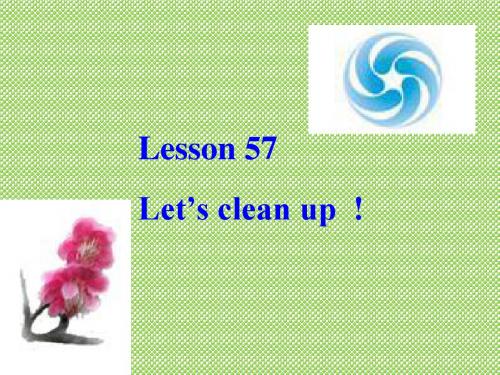
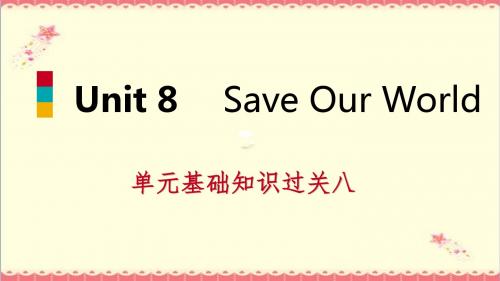
英语八年级下翼教版Unit 8 Save our world教案 2一. 教学内容:Unit 8 Save Our Worl dLesson 57~ Lesson 60[1. 单词和短语n. yard rubbish garbage bit a bi t of pollution bag environment litre toilet sink tap metal plastic weight packaging percent cassette deck buzz powerv. pick up throw away pollute take out leak waste fix recycle save sort mend tear(tore/ torn)must reuse touch repairadj. less reusable least leaky plasticadv. exactly2. 语法(1)学习如何提供帮助(2)宾语从句用法3. 语言目标(1)Can I help you? What can I do for you?(2)I don’t think(that)he will come.二. 重点、难点分析:1. sunny adj阳光充足的,照耀的,快乐的a sunny day晴朗的日子a sunny r oom阳光充足的房间a sunny smile温和的微笑The day was bright and sunny. 阳光灿烂的日子。
sun n. 太阳;阳光;向阳处;有阳光的地方The sun rose at six o’clock. 太阳六点钟升起。
sit in the sun 坐在阳光下2. rubbish n. 垃圾,废物,废话同义词:garbage[rubbish collection 垃圾堆rubbish pail 垃圾桶garbage can/truck 垃圾箱/车household garbage 生活垃圾literary garbage 无聊读物表示“垃圾”的词:(1)trash n. 垃圾。